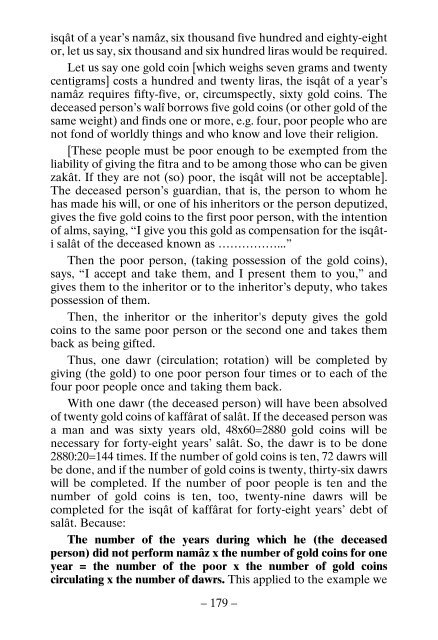Book of Namaz
Create successful ePaper yourself
Turn your PDF publications into a flip-book with our unique Google optimized e-Paper software.
isqât <strong>of</strong> a year’s namâz, six thousand five hundred and eighty-eight<br />
or, let us say, six thousand and six hundred liras would be required.<br />
Let us say one gold coin [which weighs seven grams and twenty<br />
centigrams] costs a hundred and twenty liras, the isqât <strong>of</strong> a year’s<br />
namâz requires fifty-five, or, circumspectly, sixty gold coins. The<br />
deceased person’s walî borrows five gold coins (or other gold <strong>of</strong> the<br />
same weight) and finds one or more, e.g. four, poor people who are<br />
not fond <strong>of</strong> worldly things and who know and love their religion.<br />
[These people must be poor enough to be exempted from the<br />
liability <strong>of</strong> giving the fitra and to be among those who can be given<br />
zakât. If they are not (so) poor, the isqât will not be acceptable].<br />
The deceased person’s guardian, that is, the person to whom he<br />
has made his will, or one <strong>of</strong> his inheritors or the person deputized,<br />
gives the five gold coins to the first poor person, with the intention<br />
<strong>of</strong> alms, saying, “I give you this gold as compensation for the isqâti<br />
salât <strong>of</strong> the deceased known as ……………...”<br />
Then the poor person, (taking possession <strong>of</strong> the gold coins),<br />
says, “I accept and take them, and I present them to you,” and<br />
gives them to the inheritor or to the inheritor’s deputy, who takes<br />
possession <strong>of</strong> them.<br />
Then, the inheritor or the inheritor's deputy gives the gold<br />
coins to the same poor person or the second one and takes them<br />
back as being gifted.<br />
Thus, one dawr (circulation; rotation) will be completed by<br />
giving (the gold) to one poor person four times or to each <strong>of</strong> the<br />
four poor people once and taking them back.<br />
With one dawr (the deceased person) will have been absolved<br />
<strong>of</strong> twenty gold coins <strong>of</strong> kaffârat <strong>of</strong> salât. If the deceased person was<br />
a man and was sixty years old, 48x60=2880 gold coins will be<br />
necessary for forty-eight years’ salât. So, the dawr is to be done<br />
2880:20=144 times. If the number <strong>of</strong> gold coins is ten, 72 dawrs will<br />
be done, and if the number <strong>of</strong> gold coins is twenty, thirty-six dawrs<br />
will be completed. If the number <strong>of</strong> poor people is ten and the<br />
number <strong>of</strong> gold coins is ten, too, twenty-nine dawrs will be<br />
completed for the isqât <strong>of</strong> kaffârat for forty-eight years’ debt <strong>of</strong><br />
salât. Because:<br />
The number <strong>of</strong> the years during which he (the deceased<br />
person) did not perform namâz x the number <strong>of</strong> gold coins for one<br />
year = the number <strong>of</strong> the poor x the number <strong>of</strong> gold coins<br />
circulating x the number <strong>of</strong> dawrs. This applied to the example we<br />
– 179 –

















